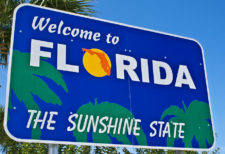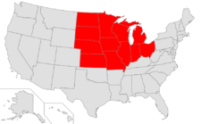Two more midwestern states passed laws last month requiring newspapers to post notices on their press association’s statewide public notice website. With Minnesota and Michigan joining South Dakota and Nebraska, four states in the region have now passed web-posting laws this year.
In total, eighteen states now have web-posting statutes on the books.
The new law in Minnesota requires newspapers to publish their notices on the Minnesota Newspaper Association’s statewide public notice website and to include an index link to the public notice section on their own websites. (Current law in Minnesota already requires newspapers to post notices on their website; the new law adds the index-link requirement and forbids the notices from being posted behind a paywall.)
Midwest press groups seek to modernize public notice laws
 (This article was corrected on April 28, 2022. See below for corrections.)
(This article was corrected on April 28, 2022. See below for corrections.)
Press associations in four midwestern states are supporting bills that would update their states’ public notice laws.
Legislatures in Minnesota and Nebraska are considering bills that would require newspapers to post all notices on their press association’s statewide public notice website. Also in Minnesota, and in Missouri, lawmakers may respond to an evolving local media environment by relaxing standards newspapers must meet to qualify to publish notices. And in South Dakota, the legislature has already passed a bill with primary elements identical to the legislation being considered in Minnesota.
New Florida public notice law first to authorize internet-only notices
 Last Thursday evening, the Florida legislature passed the most significant piece of public notice legislation in modern history.
Last Thursday evening, the Florida legislature passed the most significant piece of public notice legislation in modern history.
Sen. Ray Rodrigues’ (R-Fort Myers) SB402 makes Florida the first state in the country to significantly dilute the statutory requirement that notices must be published in print newspapers. But there’s a lot for the newspaper industry and residents of the state to like about the bill.
It’s certainly an improvement over the alternative, Rep. Randy Fine’s (R-Palm Bay) HB35, which would have moved public notice in the state from newspapers to government websites. Fine’s bill had passed the House by the time SB402 started picking up steam in the Senate.
Local officials use public notice as tool of vengeance
 After 30 years of serving as the official newspaper in Gardner, Kansas, the local paper is calling foul following the town’s decision to pull its public notices and place them in another publication with no print circulation in Gardner.
After 30 years of serving as the official newspaper in Gardner, Kansas, the local paper is calling foul following the town’s decision to pull its public notices and place them in another publication with no print circulation in Gardner.
“The council members are trying to punish me because they don’t like the way I have been covering the city,” said Rhonda Humble, owner and publisher of The Gardner News. “They are trying to shut me up.”
Public notice eligibility requirements at issue in California and Georgia locales
 Detailed news coverage of the criteria required for newspapers to qualify to publish notices is rare. But last month we found two stories focused largely on that issue. Together they illustrate the policy implications of the choices legislators make when they enact public notice eligibility requirements.
Detailed news coverage of the criteria required for newspapers to qualify to publish notices is rare. But last month we found two stories focused largely on that issue. Together they illustrate the policy implications of the choices legislators make when they enact public notice eligibility requirements.
The first story comes from southeast Georgia, where The Brunswick News reported on the closing of the Waycross Journal-Herald, a 105-year-old daily newspaper that published its last issue on Monday, Sept. 30. Stories about newspapers closing are not uncommon these days. But focusing, as The News did, on the challenge facing public officials in neighboring counties who need to find an alternative “legal organ” is unusual.
In year of heightened legislative activity, Arkansas and Virginia score big wins
 We’re only four months into the year and more public notice bills* have already been enacted than in all of 2018.
We’re only four months into the year and more public notice bills* have already been enacted than in all of 2018.
Like 2018, the truly bad bills — the existential threats to newspaper notice — are either going nowhere or have already been defeated. The two state press groups that appeared to face the greatest danger — Missouri Press Association and Hoosier State Press Association, both of which fought bills that would have eliminated newspaper notice of foreclosure sales — survived to fight another day. Indiana HB1212 passed the House but died in the Senate when the legislature adjourned last week. Missouri HB686/SB50 hasn’t managed to make it out of committee in either chamber with only two weeks left in the session even though an almost-identical piece of legislation came dangerously close to passage in 2018.
Voters Go to the Polls to Select Official Newspapers in N.D.
See the post-election postscript at the end of this post.  If we had a category in our annual Public Notice Journalism Contest for best lede, Jack Dura of the Bismarck Tribune would probably win with this one: “Races for official county newspaper don’t usually headline election years, but a few papers around North Dakota could flip in this cycle.”
If we had a category in our annual Public Notice Journalism Contest for best lede, Jack Dura of the Bismarck Tribune would probably win with this one: “Races for official county newspaper don’t usually headline election years, but a few papers around North Dakota could flip in this cycle.”
It turns out that in North Dakota, when a county has at least two newspapers local voters often get to decide which one is designated to serve as the official publisher of notice. It appears to be the only state that designates official newspapers by ballot.

